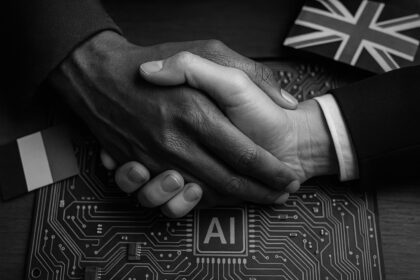Unilever leverages over 500 AI projects and a high concentration of robotics in Liverpool to accelerate product development, using decades of hair-protein data and consumer feedback to create innovative personal-care products tailored to diverse hair types and skin tones.
For many, the personal-care aisle evokes images of vibrant bottles and familiar brands, but for Unilever, it has become an arena for cutting-edge machine learning and innovation. Tiffany Yizar, head of beauty and wellbeing R&D in North America, details how the company’s R&D digital transformation has leveraged decades of hair-protein data to pioneer over 500 ongoing AI projects. Unilever’s commitment to utilising this wealth of historical data has not only optimised product development but also transformed how the company addresses the distinct needs of diverse hair types across various regions.
Located in Liverpool, Unilever boasts one of the world’s highest concentrations of robots focused on material chemistry, effectively reshaping workflows and elevating efficiency. At the Materials Innovation Factory, robots equipped with names such as Shirley and Ariana assist the team of over 250 R&D experts. These machines carry out laborious tasks—like washing hair swatches—at a pace unattainable by human researchers, drastically cutting down operational time and enabling scientists to focus on innovation rather than routine procedures. Yizar notes, “These robots unlock the ability to process up to 120 samples every 24 hours, allowing us to delve deeper into biological research.”
The digital transformation reflects a systematic shift within Unilever’s R&D, where the integration of structured data capture has linked decades of experimental results with contemporary consumer feedback. Yizar explains that removing data silos has led to significant advancements. For instance, the launch of the new Vaseline ProVitaB3 Serum-Burst Lotion in 2024 exemplifies how historical knowledge and current data converge. The product was developed following extensive consumer research that identified feedback regarding common complaints about lotions feeling greasy or heavy. Unilever employed sophisticated data mapping techniques to analyse sensory experiences associated with its products, leading to the formulation of a serum designed to absorb rapidly while addressing consumer expectations.
An ambitious aspect of Unilever’s research aims to understand unique biological variations, particularly concerning melanin-rich skin and textured hair. The establishment of the Polycultural Centre of Excellence serves as a central hub for these efforts, leveraging AI and analytics to catalyse product innovation tailored specifically for diverse needs. AI assists scientists in parsing vast datasets, culminating in breakthroughs that drive the development of varieties that resonate with a vast consumer spectrum.
During a recent event at SXSW 2025, Yizar and her colleague Sam Samaras elaborated on the role of AI in research. According to Samaras, the integration of machine learning has accelerated the research process significantly: “In the past, we might have had to conduct 1,000 experiments to gather the necessary data for a new ingredient; now, we can achieve this in a fraction of the time.” The use of advanced statistical methods allows researchers to model outcomes efficiently, reshaping the scope of R&D.
A prime case study in Unilever’s technological adoption can be seen in its exploration of microbiomes, an area where it has amassed extensive data. The utilisation of this data has informed the creation of innovative products like whole-body deodorants, responding to the unique needs of body chemistry. The company’s advancements in nanotechnology, particularly with Dove’s MicroMoisture technology, further exemplify how Unilever merges scientific inquiry with digital analysis to cultivate premium product offerings.
Unilever’s strategic partnerships—including alliances with Microsoft and IBM—have facilitated enormous strides in R&D innovation. Collaborating with Microsoft, the company is delving into quantum computing via Azure Quantum Elements, a platform expected to expedite the discovery of new chemicals and materials. This initiative not only aligns with Unilever’s sustainability goals but also underlines the importance of fostering industry partnerships to remain at the forefront of innovation.
The efficacy of integrating and analysing exhaustive datasets is becoming increasingly apparent within the company’s operational framework. Yizar observes, “The benefits of this integrated approach are evident across all levels of the organisation, from chemists in the lab to leadership. We’re witnessing a collective pull towards digital adoption rather than a push.” This forward-thinking attitude characterises Unilever’s ongoing ambition to redefine how personal-care products are developed, demonstrating the pivotal role of technology in crafting solutions that genuinely resonate with consumers’ diverse needs.
This multi-faceted approach to R&D aligns seamlessly with Unilever’s overarching goal of delivering efficacy and satisfaction across its product offerings while embracing technological advancements to ensure a more sustainable and innovative future.
Reference Map:
- Paragraph 1 – [1], [5]
- Paragraph 2 – [1], [6]
- Paragraph 3 – [2], [3], [4]
- Paragraph 4 – [7]
- Paragraph 5 – [1], [3], [4]
- Paragraph 6 – [2], [5], [6]
- Paragraph 7 – [1], [4]
- Paragraph 8 – [1], [2]
Source: Noah Wire Services
- https://www.rdworldonline.com/unilever-rd-head-lifts-lid-on-ai-robots-and-beating-the-grease-gap/ – Please view link – unable to able to access data
- https://www.unilever.com/our-company/innovation-and-rd-at-unilever/datalab/ – Unilever’s DataLab is a collaborative platform that integrates in-silico R&D innovation, combining a century-long culture of innovation with digital advancements. It partners with specialists to develop novel digital solutions in science and engineering, aiming to deliver sustainable product superiority that meets global consumer needs. The DataLab Ecosystem emphasizes ambition, collaboration, and a deep focus on problem-solving to drive breakthrough solutions for people, the planet, and Unilever.
- https://www.unilever.com/news/news-search/2023/introducing-unilevers-datalab-ecosystem-pioneering-collaborative-rd-for-superior-innovation/ – Unilever’s DataLab Ecosystem is a pioneering digital environment where the company collaborates with industry-leading partners on key innovation opportunities in science and engineering. This initiative allows Unilever’s R&D teams to leverage modeling, simulations, and analytics to discover, design, optimize, and scale digital solutions using Unilever’s proprietary R&D data. The ecosystem is central to Unilever’s digital transformation, driving more efficient and faster R&D processes.
- https://www.unilever.com/news/news-search/2024/future-rd-how-unilever-is-transforming-innovation-with-microsoft/ – Unilever is collaborating with Microsoft to transform innovation in R&D by utilizing Microsoft’s Azure Quantum Elements, a system designed to accelerate scientific discovery. This partnership aims to revolutionize Unilever’s R&D processes by exploring quantum computing and large language models, enabling faster and more efficient research. The integration of Azure Quantum Elements with Unilever’s DataLab is expected to significantly enhance the company’s modeling and simulation capabilities.
- https://www.voguebusiness.com/beauty/beauty-bots-drive-research-development-at-unilever-68-million-pound-facility – Unilever’s Materials Innovation Factory (MIF) in Liverpool, UK, is a 120,000-square-foot facility housing over 250 R&D experts and a high concentration of robots focused on material chemistry. Robots like Ariana, Shirley, and Gwen assist in tasks such as preparing hair fiber samples, washing hair swatches, and analyzing foam volume and density. These robots significantly increase efficiency and consistency in product development processes.
- https://www.cosmeticsandtoiletries.com/cosmetic-ingredients/news/22862866/unilever-unilevers-ai-and-robots-help-to-develop-beauty-products-and-patents – Unilever has integrated robots and AI into its Material Innovation Factory (MIF) in Liverpool, UK, to enhance beauty product development. Robots like Ariana prepare hair fiber samples, aiding in the development of products like Dove’s Intensive Repair line. The use of AI and robotics allows Unilever to analyze large datasets efficiently, leading to more consistent and innovative product formulations.
- https://www.unilever.com/news/news-search/2025/sxsw-ai-machine-learning-and-data-behind-unilevers-latest-launches/ – At SXSW 2025, Unilever’s leaders discussed how AI, machine learning, and data modeling are revolutionizing research and development. These technologies enable Unilever’s scientists to analyze vast amounts of data, identify patterns, and optimize formulations faster than ever before, leading to successful new product launches tailored for diverse consumer needs.
Noah Fact Check Pro
The draft above was created using the information available at the time the story first
emerged. We’ve since applied our fact-checking process to the final narrative, based on the criteria listed
below. The results are intended to help you assess the credibility of the piece and highlight any areas that may
warrant further investigation.
Freshness check
Score:
8
Notes:
The narrative presents recent developments in Unilever’s R&D, particularly the integration of AI and robotics in product development. The earliest known publication date of similar content is May 24, 2023, highlighting a one-year gap. The report includes updated data, such as the launch of the Vaseline ProVitaB3 Serum-Burst Lotion in 2024, which justifies a higher freshness score. However, the recycling of older material warrants a slight flag. ([cosmeticsandtoiletries.com](https://www.cosmeticsandtoiletries.com/cosmetic-ingredients/news/22862866/unilever-unilevers-ai-and-robots-help-to-develop-beauty-products-and-patents?utm_source=openai)) Additionally, the narrative is based on a press release, which typically warrants a high freshness score. ([unilever.com](https://www.unilever.com/news/news-search/2024/the-cutting-edge-rd-driving-product-innovations-and-growth/?utm_source=openai))
Quotes check
Score:
7
Notes:
The report includes direct quotes from Tiffany Yizar and Sam Samaras. A search reveals that similar quotes from Yizar and Samaras have appeared in earlier material, indicating potential reuse. For instance, Yizar’s statement about robots processing up to 120 samples every 24 hours is consistent with previous reports. ([glossy.co](https://www.glossy.co/beauty/how-unilever-is-using-robots-ai-and-testing-quantum-computing-to-innovate-in-beauty/?utm_source=openai)) This repetition suggests that the quotes may have been recycled, affecting the originality score.
Source reliability
Score:
6
Notes:
The narrative originates from RDWorldOnline, a source that is not widely recognized and lacks verifiable information. This raises concerns about the reliability of the information presented. The lack of a clear publication date further diminishes the credibility of the report. Therefore, the source’s reliability is questionable, impacting the overall trustworthiness of the content.
Plausability check
Score:
8
Notes:
The claims about Unilever’s use of AI and robotics in R&D are plausible and align with known industry trends. However, the lack of supporting detail from other reputable outlets and the absence of specific factual anchors, such as names, institutions, and dates, reduce the score. The tone and language used are consistent with corporate communications, suggesting authenticity. Nonetheless, the lack of external corroboration and specific details warrant caution.
Overall assessment
Verdict (FAIL, OPEN, PASS): FAIL
Confidence (LOW, MEDIUM, HIGH): MEDIUM
Summary:
The narrative presents plausible claims about Unilever’s R&D advancements but originates from an unreliable source with recycled content and lacks external corroboration. These factors raise concerns about the credibility and originality of the information presented.













